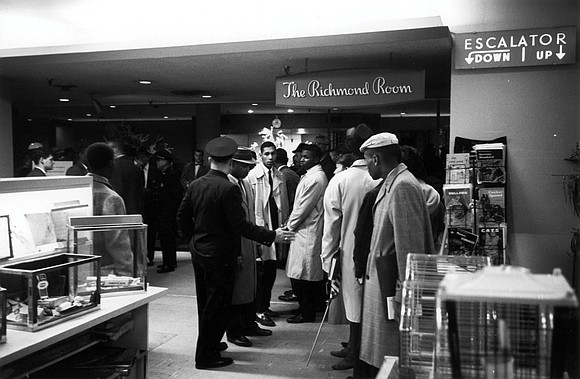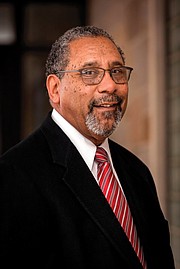Case closed on Richmond 34
Criminal records from the Feb. 22, 1960, arrests of 34 VUU students protesting racial segregation at a Downtown department store will be expunged Friday, 59 years later
By Reginald Stuart | 2/22/2019, 6 a.m.

The students from Virginia Union University walked enthusiastically with pride, determination, respect and self confidence. Block by block down Lombardy Street to Broad Street they walked — young men dressed in shirts and ties and young ladies wearing dresses and heels.
Like Anderson “A.J.” Franklin, a young sociology student from Brooklyn, N.Y., and Elizabeth Johnson, a biology major from Richmond, the students enthusiastically headed to Thalhimer’s department store in Downtown to picket the store and head inside to sit-in in defiance of its whites-only lunch counter and dining room policy. As they marched, they had no idea they were helping write a new chapter in American history.
Within a few hours, Dr. Franklin, Ms. Johnson and 32 of their classmates had been arrested by Richmond Police, booked, fingerprinted and released on trespassing charges. Unknown to Mr. Franklin and his cohorts, their bail had been posted by hundreds of people in the community who tossed in $1, $5, $10 and more.
Dr. Franklin recalled that the late Dr. Allix B. James, then vice president at VUU, put his house up as collateral to help raise bail money for the students, who became known as the Richmond 34.
On Friday, 59 years to the day since their historic protest on Feb. 22, 1960, the stage is set for finally closing this chapter from the past. With the help of the Richmond NAACP and local legal experts, officials plan to wipe the former students’ arrest records clean.
For sure the VUU students went to trial on misdemeanor trespassing charges brought by Richmond Police. The 34 were convicted by a Richmond court and each fined between $20 and $30, said Birdie H. Jamison, a former Richmond General District Court judge who is spearheading the record expungement effort as chair of the Richmond NAACP Legal Redress Committee.
Even after a round of appeals, their convictions were upheld in 1961 by the Virginia Supreme Court. But when their case reached the U.S. Supreme Court in 1963, the nation’s highest court remanded the case back to Virginia for a new hearing.
On Oct. 28, 1965, Ms. Jamison said, all of the charges against the Richmond 34 were dismissed.
“Imagine, five years. Five years,” Ms. Jamison said.
Only no one realized until last year that their criminal records from challenging segregation had never been expunged from the public record. Each person must individually go through a detailed paperwork process, including providing authorities a hard copy of their original arrest record, in seeking to wipe a record clean.
“We knew the case had been dismissed,” said Dr. Franklin, who went on to earn advanced degrees and is now eyeing retirement from Boston College where he is a professor of counseling psychology in the Lynch School of Education and Human Development.
But last year, Dr. Franklin’s application for the Global Entry program for expedited processing for re-entry into the United States after international travel was rejected by the U.S. Customs and Border Protection. He learned because he still had an arrest record on file from the Feb. 22, 1960, demonstration at Thalhimer’s. No resolution of the case had been filed.
Dr. Franklin and Ms. Johnson, now Elizabeth Johnson Rice, an educator for more than 30 years and founder of the BPOS Foundation, Be Part of the Solution, Ms. Jamison and a small entourage of city officials will be heading to Chief Judge Joi Jeter Taylor’s courtroom Friday in Richmond Circuit Court for a special hearing to have their records expunged.
Before that, the Richmond 34 will be honored in the Virginia General Assembly with a joint resolution presented by Richmond Delegate Delores L. McQuinn in the House chamber, and they will talk with current VUU students during a panel discussion at 11 a.m. Friday at the Claude G. Perkins Living and Learning Center at VUU. The panel discussion is open to the public.
“It’s going to be a celebration and inspiration,” Ms. Jamison said.
Nearly half a dozen of the Richmond 34 have died, Ms. Johnson Rice said. The university and others have lost touch with several others.
Still, five of the 34, Dr. Franklin and Mrs. Johnson Rice among them, are to receive the General Assembly resolution, letters and a city proclamation declaring Feb. 22 the Richmond 34 Day to salute their efforts to peacefully tear down Richmond’s racial barriers from public eating places.
Acting Richmond Police Chief William C. Smith is to be present at the expungement hearing, along with Richmond Sheriff Antionette Irving and Richmond Commonwealth’s Attorney Michael Herring. Richmond lawyer Devika E. Davis is representing the former students in court.
Ms. Jamison said the Richmond Branch NAACP will continue to work with the Richmond 34 members or their survivors who are not able to participate on Friday.
“You have to go do x, y and z to get this done,” said Ms. Jamison, “You have to attach the original paper work and be fingerprinted,” she said.
Still, Ms. Jamison said, the exercise has been worth it.
“Everybody has been very supportive of the group,” she said.
Dr. Franklin said the discovery of his misdemeanor arrest record and absence of any notation of its dismissal causes him some concern.
“Any one of us could have lost an opportunity because we had a record,” he said, adding he understands that some employers simply remove candidates from consideration when a background check notes the applicant has been arrested.
Now, that will all be in the past. Case closed.









